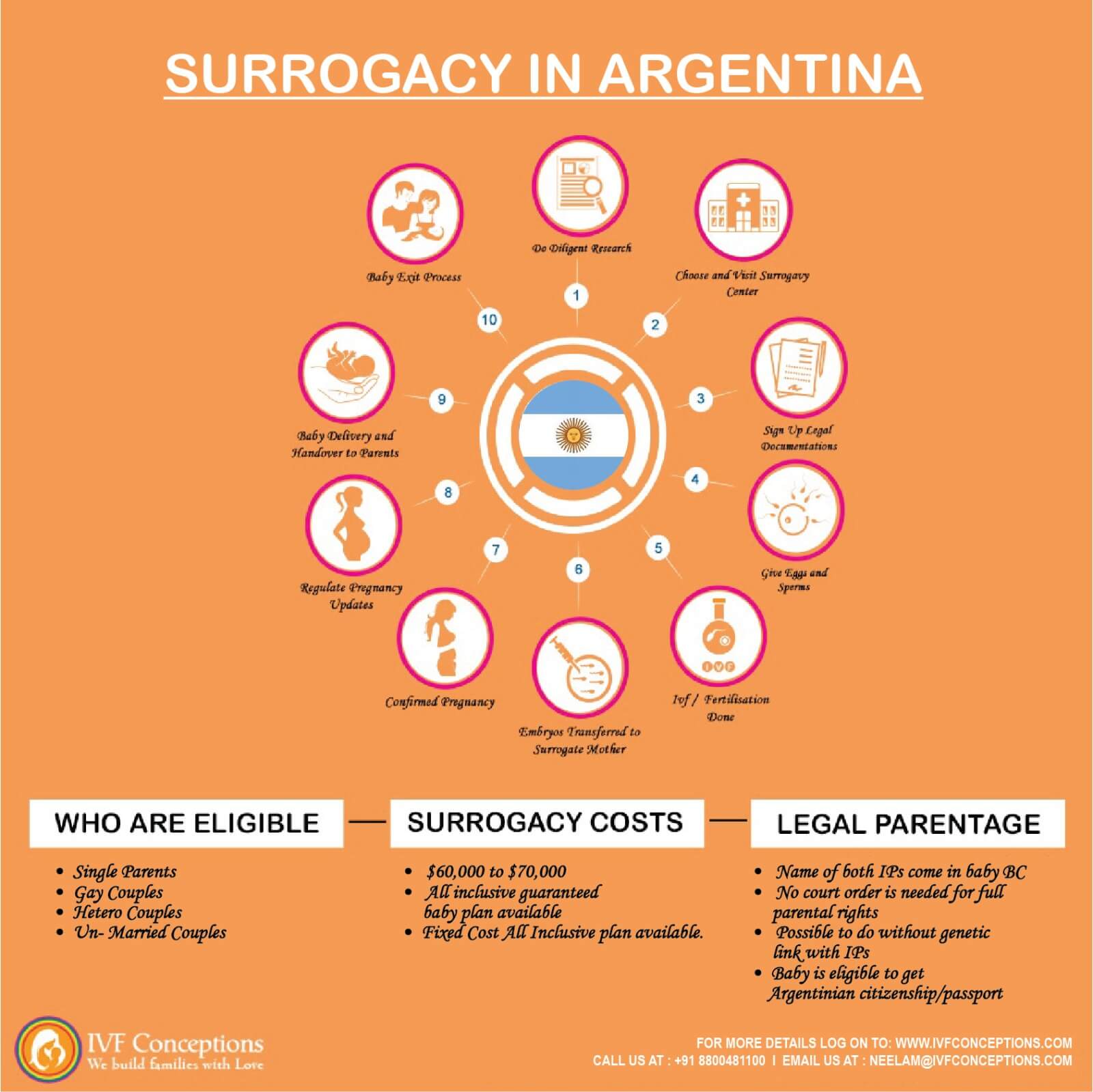Surrogacy in Argentina| Gay Surrogacy Cost in Argentina

Gestational surrogacy is a process in which a woman carries a baby for another person or couple who cannot conceive on their own. When it comes to surrogacy, Argentina has become a popular destination for intended parents from all over the world. In Argentina, surrogacy is available to singles and couples of any marital status, sexual orientation, or nationality in Buenos Aires. Children born through surrogacy are entitled to an Argentine passport.
In this article, we will provide you with a comprehensive guide to gay surrogacy in Argentina and why you should consider growing your family through surrogacy in Argentina.
Get in touch for a Free Surrogacy Consultancy:
📲 +91-8800481100 ( WhatsApp, Line, Viber)
Additional guide for Argentina Surrogacy:
How much does surrogacy cost in Argentina?
Low-Cost Surrogacy in Argentina
How to Find a Surrogate Mother in Argentina
FAQ for Surrogacy in Argentina for our Guaranteed Surrogacy Baby
Surrogacy in Argentina- Everything You Need to Know!
Why USA Couples Should Do Surrogacy In Argentina
x The Legal Landscape of Argentina Surrogacy
The Legal Landscape of Argentina Surrogacy
Argentina is becoming an increasingly popular destination for surrogacy among various groups, including singles, same-sex couples, single males, and married or non-married heterosexual couples.
The legal framework in Buenos Aires is highly favorable for surrogacy, as only the intended parent(s) are listed on the birth certificate of the newborn, granting them full parental rights from the moment of birth.
In 2017, a series of legal challenges in Argentina resulted in a judicial ruling in Buenos Aires that recognized the rights of parents through surrogacy to be legally recognized as parents on the birth certificate without requiring a court order, provided that certain requirements are met.
Argentina has a progressive approach to surrogacy, as it is one of the few countries in Latin America that allows surrogacy for all couples and individuals, regardless of their sexual orientation.
However, it is important to note that surrogacy is only legal when it is altruistic, meaning that the surrogate mother cannot receive any compensation for carrying the baby. Additionally, surrogacy must be done through a court order and the intended parents must be Argentine residents, except Buenos Aries.
Surrogacy in Argentina is regulated by the National Ministry of Health. According to Argentine law, surrogacy can only be performed if there is a medical indication that a woman cannot carry a pregnancy to term or if the pregnancy would endanger her life.
Additionally, the surrogate must be over 25 years old, have given birth to at least one child, and have undergone psychological evaluation.
Types of Surrogacy in Argentina
In Argentina, only gestational surrogacy is allowed. In such an arrangement, the surrogate is only a carrier of the baby and has no genetic link with the baby. The surrogate carries an embryo created using the intended parents’ or donors’ egg and sperm through in vitro fertilization (IVF).
Who can do surrogacy in Argentina?
- Single parents
- Hetero married couples
- Not-married hetero couples
- Gay couples

Why gay surrogacy in Argentina?
The country’s capital and largest city, Buenos Aires, has become an important recipient of LGBT tourism and has been described as “South America’s gay capital”. Argentina is a great place to live or visit. The country has a lot to offer and is one of the safest countries on the continent, with a developed infrastructure, nice weather, and kind people.
Gay surrogacy in Argentina will gain popularity due to many favorable factors.
Mainly, for same-sex couples who wish to have both parents’ names on the baby’s birth certificate, it is a great option as it is possible to have both parents’ names, and no court order is needed.
In 2015 Argentina’s Civil Code was reformed, and it admitted a third source of reproduction and birth via ART. Surrogacy was not cited and it was not forbidden as well. Thus, there is no legislative regulation of surrogacy in Argentina that permits or forbids any method or procedure for having a baby via third-party reproduction.
Under Argentine law, such processes must be altruistic, meaning a surrogate can be paid only real expenses. Since 2013, mainly Argentine nationals have engaged in surrogacy however, more lately foreigners are paying attention to surrogacy in Argentina given surrogacy is allowed regardless of the nationality of the parents and the sexual inclination of the intended parents.
After the birth, parents must register the baby at the Civil Registry. Obtaining an Argentinean passport and citizenship for a newborn can take up to 4 weeks.

LGBT surrogacy in Argentina
All family types, including single males/females, same-sex couples, unmarried hetero couples, and married hetero couples are eligible to opt for surrogacy services.
Legalization of same-sex marriage and same reproductive/family/ and parental rights as hetero couples make Argentina an attractive option for gay couple surrogacy
Gay marriage was legalized in Argentina on 15 July 2010, after an encouraging vote in both the Chamber of Deputies (lower house) and the Senate (upper house). Same-sex couples are thus eligible for the same benefits and protections as opposite-sex couples (including adoption). Some cities also have civil union laws that continue to be in place as an alternative to marriage but offer more partial rights.
It is possible to have both parents’ names (for a same-sex couple) on the baby’s birth certificate. Also, the baby can get Argentinian citizenship and a passport, if needed.
Adoption and parenting rights
Same-sex couples have been able to legally adopt since July 2010, when the same-sex marriage legislation went into effect.
Although Argentina does not have laws regarding the handover of parentage after surrogacy birth, in the City of Buenos Aires, a previous class action means intended parents are recognized as legal parents. Both intended parents (or a single parent) appear on the baby’s birth certificate in surrogacy cases. The surrogate mother’s name is not mentioned. Such surrogacy-born children are also entitled to an Argentine passport. (Registry of Marital Status and Legal Capacity of the City of Buenos Aires issued Regulations 93/DGRC/17, 103/DGRC/17, and 122/DGRC/20).
Cost of gay surrogacy in Argentina
On average, the cost of surrogacy in Argentina ranges from $70,000 to $80,000 USD. A typical surrogacy package consists of medical expenses, egg donor fees, surrogate mother compensation, legal fees, and agency fees. However, the cost can be higher or lower depending on the specifics of each case.
After many countries ban gay surrogacy, there is a great demand for new surrogacy countries for gay couples that are secure and affordable. Surrogacy for gay couples is legal in Argentina, and the country has become a popular destination for surrogacy due to its favorable laws and relatively low surrogacy cost.
Surrogate mother cost in Argentina falls in the same range as in Mexico and Colombia. The surrogacy arrangement is altruistic and it is possible to reimburse for medical, travel, loss of wages, etc.
Additional guide for Argentina Surrogacy:
How much does surrogacy cost in Argentina?
Low-Cost Surrogacy in Argentina
How to Find a Surrogate Mother in Argentina
FAQ for Surrogacy in Argentina for our Guaranteed Surrogacy Baby
Surrogacy in Argentina- Everything You Need to Know!
Why USA Couples Should Do Surrogacy In Argentina
Benefits of Surrogacy in Argentina
Surrogacy in Argentina offers several benefits, such as:
- Favorable legal framework that ensures the rights and protections of all parties involved.
- The cost of surrogacy in Argentina is relatively lower compared to other countries like the USA.
- The country also has excellent medical facilities and experienced professionals who can provide high-quality care throughout the surrogacy process.
- The reproductive and adoption rights of gay couples are the same as heterosexual couples.
- Last but not least, both intended parents’ names can come on the baby’s birth certificates right after the birth of the baby, and no court order or second adoption is needed in the case of gay couple surrogacy.
Additional Guides:
Best Countries for Gay Surrogacy
Cheapest Country For Gay Surrogacy- Colombia
Complete Gay Surrogacy Guide For LGBT Parenting in 2023
 Conclusion
Conclusion
Surrogacy in Argentina offers a viable option for those seeking parenthood, especially for same-sex couples. The legal framework ensures the rights and protections of all parties involved, while the relatively lower cost of surrogacy compared to other countries makes it an attractive option.
If you are looking for reliable, affordable, and fixed-price surrogacy services get in touch with IVF Conceptions. We help would-be parents choose the affordable and legal surrogacy country as per their specific case and then manage their full program with our local partner team till the time they go home.
Get in touch for a Free Surrogacy Consultancy:
📲 +91-8800481100 ( WhatsApp, Line, Viber)
Why Choose IVF Conceptions for your surrogacy process in Argentina?
Why IVF Conceptions is the best surrogacy agency/consulting for Mexican Surrogacy. With our in-house IVF clinic in Argentina and our own surrogacy agency, we offer comprehensive and end-to-end services.
More Affordable Options
- Costs in Argentina are very affordable due to currency exchange rates
- Provides a high-quality, legal, and more affordable option for all family types
- Up to 70% less expensive than surrogacy in the United States
You can plan and Control your Budget
- Multi-transfer programs available
- Secure Plan with fixed-price fertility treatment for budget certainty
Bilingual Support Team
- Surrogacy support and legal team speaks English and Spanish
- Easy communication throughout the process
High-Quality Treatment/IVF/Prenatal care/Birt
- Modern reproductive medicine clinics
- Access to the latest assisted reproduction techniques
- Pre-implantation genetic testing (PGT-A)
- Genetic carrier screening for inheritable diseases
- Non-invasive prenatal testing (NIPT) during pregnancy
Extensive Experience our surrogacy team
- Tremendous experience working with intended parents from many countries
- Over 14 years of experience across 60+ countries
- Pioneered international surrogacy in several nations
Large Egg Donor Pool
- A large group of egg donors with diverse physical characteristics
- Meets the needs of most intended parents
Advanced Medical System
- Argentina’s medical system ranked as the best in South America
- Universal healthcare eligibility for all individuals
Newborn Insurance Included
- Surrogates and newborns are covered by insurance
- Mitigates risks and controls budget for potential complications
Frequently Asked Questions (FAQs):
Who Qualifies for Surrogacy in Argentina?
- Individuals who have entered into a procreational will arrangement with prior, free, and informed consent, duly notarized, are eligible, irrespective of marital status or sexual orientation. Additionally, single parents, gay men, gay couples, and hetero couples can enter into surrogacy programs.
Is Legal Representation Provided Throughout the Entire Process?
- Yes, you will have legal representation from the inception of the process until you obtain the birth certificate for your baby.
Are There Prerequisites for Program Acceptance?
- Yes, both you and your partner (if applicable) must provide a recent criminal record check and undergo a psycho-social evaluation to be eligible. The same requirements apply to your surrogate.
Is Argentina a Safe Destination?
- Buenos Aires, Argentina, often referred to as the ‘Paris of South America,’ is considered safe. It boasts traditional European architecture, a rich culture, and is a popular tourist destination.
Can Known Egg Donors be Used?
- Argentina only allows anonymous egg donation; the use of known egg donors is not permitted.
Can I Ship Biological Materials and Sign Contracts Remotely at the Program’s Start?
- You may ship biological materials, but a biological shipper must be engaged for this purpose. While consulting contracts can be done remotely, and the procreational will can also be executed remotely.

 The Legal Landscape of Argentina Surrogacy
The Legal Landscape of Argentina Surrogacy Conclusion
Conclusion